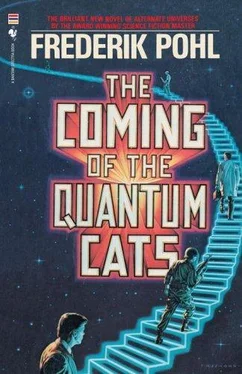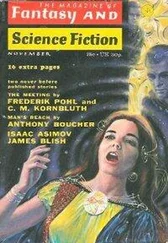Frederik Pohl - The Coming of the Quantum Cats
Здесь есть возможность читать онлайн «Frederik Pohl - The Coming of the Quantum Cats» весь текст электронной книги совершенно бесплатно (целиком полную версию без сокращений). В некоторых случаях можно слушать аудио, скачать через торрент в формате fb2 и присутствует краткое содержание. Год выпуска: 1986, ISBN: 1986, Издательство: Bantam Books, Жанр: Фантастика и фэнтези, на английском языке. Описание произведения, (предисловие) а так же отзывы посетителей доступны на портале библиотеки ЛибКат.
- Название:The Coming of the Quantum Cats
- Автор:
- Издательство:Bantam Books
- Жанр:
- Год:1986
- ISBN:9780553763393
- Рейтинг книги:5 / 5. Голосов: 1
-
Избранное:Добавить в избранное
- Отзывы:
-
Ваша оценка:
- 100
- 1
- 2
- 3
- 4
- 5
The Coming of the Quantum Cats: краткое содержание, описание и аннотация
Предлагаем к чтению аннотацию, описание, краткое содержание или предисловие (зависит от того, что написал сам автор книги «The Coming of the Quantum Cats»). Если вы не нашли необходимую информацию о книге — напишите в комментариях, мы постараемся отыскать её.
The Coming of the Quantum Cats — читать онлайн бесплатно полную книгу (весь текст) целиком
Ниже представлен текст книги, разбитый по страницам. Система сохранения места последней прочитанной страницы, позволяет с удобством читать онлайн бесплатно книгу «The Coming of the Quantum Cats», без необходимости каждый раз заново искать на чём Вы остановились. Поставьте закладку, и сможете в любой момент перейти на страницу, на которой закончили чтение.
Интервал:
Закладка:
"I didn't bring any baggage," I said. "I don't have any civilian clothes with me."
Thunderstruck stare. "You what? Christ, Major! How the hell am I supposed to get you fitted out with civvies? Where would I get them? Why the hell—" And then he turned to the sergeant. He had remembered how to get difficult tasks done. "Sergeant! Get this man fitted out with civvies!"
And so it came to pass that twenty minutes later the sergeant and I were getting out of a commandeered Cadillac limousine the size of a house trailer, in front of a store whose neon sign said: FORMAL CLOTHES RENTAL FOR ALL OCCASIONS. The neon was turned off, but the owner had opened up for us. And forty minutes after that we were on our way to the White House, and behind us the proprietor was grumpily closing his store again. "Good work, Sergeant," I said, stretching out in the back seat, which was roughly the size of a football field. I admired the gleam on the rented patent-leather shoes, smoothed down the rented satin cummerbund, adjusted the rented black bow tie. I was, I believed, the very picture of a U.S. senator coming from some formal dinner party for a late-night call on his President. "I guess the tux is the best idea," I observed, "because who knows what the current styles for men are in their time? And formal clothes don't change, do they?"
She said shortly, "We hope." Then we were at the VIP gate, and she was showing documents to the very thorough and skeptical MP, with two other MP's right behind him, looking over his shoulder. They were all armed, but they didn't have to be. Beyond them, square in the middle of the narrow drive, was a personnel carrier with a heavy machine gun mounted in the rear, and it was pointed right at us.
It took me a moment to realize that the White House had changed considerably. The strobes! They weren't there—evidently the Russian satellite had passed and they were no longer needed. That wasn't the only thing.
Even Washington Friday-night people go to bed sometime, and the traffic had been dwindling all along. Not here, though. The traffic jam was all around us, parked on the grass, crushing the roses. The lawn of our White House would be five years recovering from the tanks and half-tracks and personnel carriers that had chewed it up—"rehearsing for the parade," of course.
I could see why they were not letting ordinary civilians in.
I was no ordinary civilian, though. We were waved through at last. The weapons carrier started up and pulled off onto the grass to let us through—another hundred dollars worth of turf down the tube—and our driver took us to a small portico I had never seen before. "Good luck," said the sergeant, hesitated, then leaned forward and gave me a kiss to show she meant it.
That was the last time for quite a while that anybody showed any affection for me.
The only other time I had been in the White House was in Stevenson's second term, and it was nothing like this. Now there weren't any uniformed pages to show me around, nor velvet ropes to keep the barbarians out of the sacred chambers. There weren't any sacred chambers. There were troops in half the rooms, and machinery or weapons in most of the others. A corporal took me swiftly down a service hall and up a broad staircase, not encouraging pauses to gawk. I wound up in a green-draped room with portraits of Presidents Madison and Taft on the wall. It was a strikingly handsome room, not counting the urn of coffee with paper cups that stood on a card table near the door. The upholstered chairs were sparsely occupied—four or five civilians, one of them a woman who looked familiar, as did two of the men, especially the black one I recognized as a former heavyweight prizefighter—and eight or nine soldiers in the dress uniform of the other side, with side arms that looked as though they meant it.
Two of the soldiers got up and came toward me, hulking, huge paratroop types, both with corporal's stripes. "Here's Major DeSota, sir," said my own corporal, saluted, and left.
It is a measure of how fast things were happening that it did not occur to me that corporals did not salute corporals. I said to the bigger of the two, "The first thing I'd like is some of that coffee, Corporal."
He raised an eyebrow as thick as a chevron, then grinned.
"Let's get the man some coffee, Captain Bagget," he said. And while corporal number two went over to pour me a cup, corporal number one said, "I'm Colonel Frankenhurst, Major. Do you know your mission?"
It took me a minute to reorient. "Sorry, sir," I apologized. "Uh—only in general terms. I mean, I understand I'm supposed to find this President Reagan, and when I do you two are supposed to take her prisoner and bring her back."
"Shit," he said dispassionately. "Well, it doesn't matter. The captain and I have been rehearsing this for the past forty-eight hours. If we're stopped, I'll do the talking; all you have to do is look like a senator. Can you handle that?" Then he grinned, to show that he had the situation well in hand. "Don't worry about it, Major. First place, we may never go through. They're having trouble with the peepers; these people on the other side move around so fast they can't keep track of them. Last I heard, they weren't going to open a portal before oh-three-hundred anyway."
"That's dumb," observed the captain-corporal, returning with my coffee. "They ought to wait till morning, that way we won't look so conspicuous." The colonel only shrugged. "Of course," said the captain with a sigh, looking me up and down, "a tuxedo won't look exactly normal at eight o'clock in the morning, either."
"Six of one, half a dozen of the other," said the colonel. "Well, DeSota, would you like to meet the other doubles? This is Nancy Davis—of course you've seen her on the TV." Of course I had; she was the star of the I Remember Mama remake, and how they'd got her away from her studios and her well-advertised activities raising funds for everything from Animal Welfare to the Right to Life I couldn't guess. "She's the President." Colonel Frankenhurst grinned. "John here is a Washington police captain on special White House duty—in the real world he's an airline pilot from Ohio. And the champ is a senator like you." He watched me shake hands. "Pretty good work getting you all together," he said complacently. "We missed a few, of course. We found the President's personal maid, but she was eight months pregnant—they didn't think anybody would be fooled. And we lucked onto General Porteco, her personal military aide. Unfortunately our guy was just coming out of the DT's and they couldn't trust him to remember his lines."
The other civilian came forward. "I'm not anybody's double," he apologized. "I'm Professor Greenberg—political science. They called me in to try to get a line on what the structure of this other society is like, so I've been interviewing you doubles to see if I can figure out where the differences began. But before I get to you, Major—you've been through once already, haven't you? What's it like?"
So for the next half hour I did the talking. I didn't have that much to tell, after all—what did I know about the other side except for about a quarter of a square mile in the New Mexico desert? But it was more than anyone else present knew, and they all had questions. Professor Greenberg wanted to know how much a Coke cost out of their machines. "Senator" Clay wanted to know how many of their troops were black. "President" Nancy Davis wanted to know what the hit TV shows were, and whether I knew if abortion was legal. Colonel-corporal Frankenhurst wanted, very badly, to know how well those other guys had done in hand-to-hand combat, if any had occurred when we took over their Sandia base.
I did my best. But while I was still trying to remember who the hosts on those other guys' Today show were for Nancy Davis, there was noise in the corridor, and the door flung open and in came President Brown and entourage. He didn't look happy.
Читать дальшеИнтервал:
Закладка:
Похожие книги на «The Coming of the Quantum Cats»
Представляем Вашему вниманию похожие книги на «The Coming of the Quantum Cats» списком для выбора. Мы отобрали схожую по названию и смыслу литературу в надежде предоставить читателям больше вариантов отыскать новые, интересные, ещё непрочитанные произведения.
Обсуждение, отзывы о книге «The Coming of the Quantum Cats» и просто собственные мнения читателей. Оставьте ваши комментарии, напишите, что Вы думаете о произведении, его смысле или главных героях. Укажите что конкретно понравилось, а что нет, и почему Вы так считаете.












